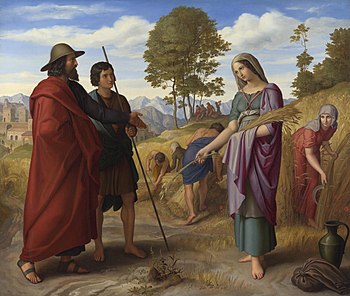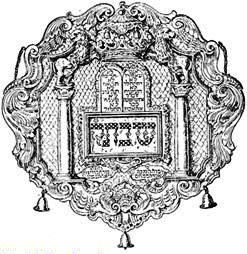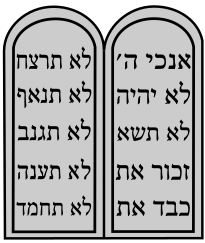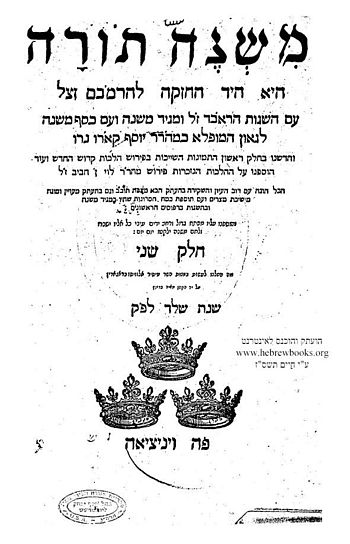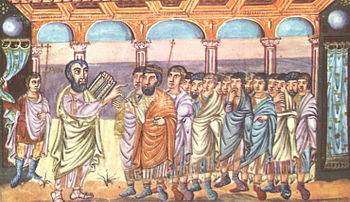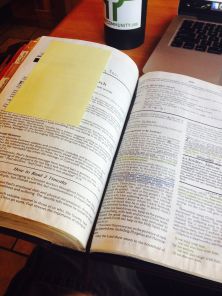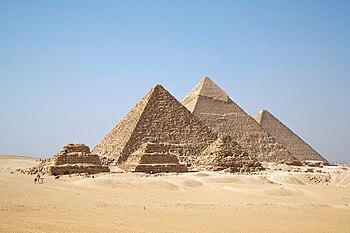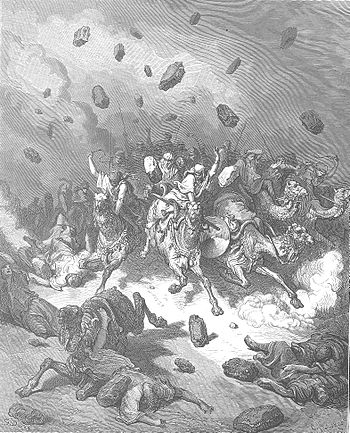On the 22nd of April the Christadelphians in Belgium met in their tiny congregation. They do not have a mega-church. They do not have their own special church building. They would love to see more people in their congregation, but they know that we are living in a time where not many are interested in God.
In the darkness and the void of the world
 Today we may find many people who would love to Get out of the dark corners of this world, and who would love to find solutions to live easier. Many do not come to see that solutions where already provided long ago. They should not stay with their depression, pain and suffering. Already long ago there was a man who was willing to take all the trouble of the world onto him. He was willing to bear all the pain of mankind and to face the death and take it with him to destroy it for ever. It looks impossible and many centuries people who could see the Works of the Divine Creator even doubted about the possibilities put in front of them. They had put lambs-blood on the doorposts, had seen that their children were saved, saw high walls of water and a road where they could pass but the soldiers of the Pharaoh were swallowed by the water, and still they doubted many times. How about us who have no such wonders in our days of our life?
Today we may find many people who would love to Get out of the dark corners of this world, and who would love to find solutions to live easier. Many do not come to see that solutions where already provided long ago. They should not stay with their depression, pain and suffering. Already long ago there was a man who was willing to take all the trouble of the world onto him. He was willing to bear all the pain of mankind and to face the death and take it with him to destroy it for ever. It looks impossible and many centuries people who could see the Works of the Divine Creator even doubted about the possibilities put in front of them. They had put lambs-blood on the doorposts, had seen that their children were saved, saw high walls of water and a road where they could pass but the soldiers of the Pharaoh were swallowed by the water, and still they doubted many times. How about us who have no such wonders in our days of our life?
Having to see what should be the centre of life

Moses with the tablets of the Ten Commandments, painting by Rembrandt (1659) (Photo credit: Wikipedia)
The previous days we have looked how God assembled Him a people and how He took care of them in difficult times. God does not change, so also today He shall be there with those who are interested in Him. He shall guide them and help them when necessary.
As we meet with the people of God assembled to hear Moses as they prepare to move into the land we see simply and clearly what should have been the centre of their lives.
Forty years before this time, the previous generation had been given the law at Mount Sinai, Moses reminded them that they had actually heard the voice of God and were filled with such fear that they required Moses to act between them and God. At this time they were reminded that it was by the power of God that they had escaped from Egypt, and that He had given them a law and commandments that were quite different from those of the Egyptians. It was a law that would set them apart from all the nations surrounding them, it was a law that would give them peace in the land that they had been promised and which they would shortly enter, it was a law based on ten short commandments.
Commandments of the Maker of the Universe

Moses with the Ten Commandments (Photo credit: Wikipedia)
But even these commandments could be powerfully summarised, as Jesus did when questioned, into two commandments. When we behave ourselves good loving all those around us with all are heart we would be good on our way, because all people who walk around on this earth are allowed to be here by the Divine Creator. Without His allowance they would not be here living. So we should respect them as creatures of the Most High and we should respect his choice and love Him for all the things He provides for them and us.
Matthew 22:36-39 The Scriptures 1998+ (36) “Teacher, which is the great command in the Torah?” (37) And יהושע {Jeshua} said to him, “ ‘You shall love יהוה {Jehovah} your Elohim with all your heart, and with all your being, and with all your mind.’ (38) “This is the first and great command. (39) “And the second is like it, ‘You shall love your neighbour as yourself.’
Getting out of bondage
In the reading of last Tuesday service we listened to the Words of God as presented in the Holy Scriptures in the Book of Deuteronomy, chapter 5.

Moses with the Ten Commandments
In that chapter we could read how Moses called to all Israel to hear the statutes and the ordinances which God had given him. They were given so that they might learn them, and observe to do them. It was in Horeb that YHWH יהוה {Jehovah} our Elohim and Highest of all made a covenant with those Israelites. It was Moses who stood between God and them at that time, to show them the words of Jehovah, for they were afraid because of the fire.
Deuteronomy 5:5-6 The Scriptures 1998+ (5) “I stood between יהוה {Jehovah} and you at that time, to declare to you the Word of יהוה {Jehovah} – for you were afraid because of the fire, and you did not go up the mountain – saying:(6) ‘I am יהוה {Jehovah} your Elohim who brought you out of the land of Mitsrayim, out of the house of bondage.
Serving only One
From the Holy One Who brought them out of the land of Egypt, out of the house of bondage they got to know that He that brought salvation to them wanted them to have no other gods before Him. They were asked not to make any engraved image for themselves, or any likeness of what is in heaven above, or what is in the earth beneath, or that is in the water under the earth, to bow down to them, nor to serve them; for He , YHWH, the Creator of heaven and earth should be their God.
Deuteronomy 5:8-11 The Scriptures 1998+ (8) ‘You do not make for yourself a carved image, any likeness of which is in the heavens above, or which is in the earth beneath, or which is in the waters under the earth, (9) you do not bow down to them nor serve them. For I, יהוה {Jehovah} your Elohim, am a jealous Ěl, visiting the crookedness of the fathers upon the children to the third and fourth generations of those who hate Me, (10) but showing kindness to thousands, to those who love Me and guard My commands. (11) ‘You do not bring{1} the Name of יהוה {Jehovah} your Elohim to naught, for יהוה {Jehovah} does not leave him unpunished who brings His Name to naught. {Footnote: 1Or lift up, or take.}
Not to make an engraved image for yourself, nor any likeness of anything that is in heaven above

Carved images in front people bow. – c. 1435 (Photo credit: Wikipedia)
Through the ages many, also those who called themselves Christian, have forgotten that rule, not to make any pictures of any god to worship in front. In many churches today we can see pictures and statues and even priests walking around in procession with shrines and books, to which people bow down and make crosses. What do they think the jealous God of the Old Testament would feel like, seeing those things which are an abomination in His eyes? God assured His people that He would look down to the earth and see how people love or hate Him. According their position against the Most High He would treat them. He would visit the iniquity of the fathers on the children, to the third and on the fourth generation of those who hate Him and would show loving kindness to thousands of those who love Him and keep His commandments.We should not take the name of YHWH יהוה {Jehovah} in vain, for He will not hold him guiltless who takes his name in vain. Therefore also those who do not believe in God, should not find any reason to use God His Name. We too have to remember that god His people were a servant in the land of Egypt, and יהוה {Jehovah} our God brought them out of there by a mighty hand and by an outstretched arm. They had as an assembly on the mountain heard out of the midst of the fire, of the cloud, and of the thick darkness, with a great voice. We to can hear that Voice of God when we are willing to find God. Like He let His Voice come out of the the midst of the darkness, we to shall be able to hear Him is ourselves when we open our heart to Him.From the Old Book of books we should come to know all the wonders God has done for those who want to follow Him. In lots of the mega churches we can find around the world not much time is spent in the Unread bestseller where the Words of God are presented to all those who want to read. But many may prefer to Look to the East and the West for Truth and try to find answers in books written by people like them. They overlook the glory and the greatness which God has shown unto the world. Not many today want to hear the Voice of God. God made the promise that in case people would fear Him and would keep His commandments always, it might be well with them, and with their children forever!
Deuteronomy 5:28-33 The Scriptures 1998+ (28) “And יהוה {Jehovah} heard the voice of your words when you spoke to me, and יהוה {Jehovah} said to me, ‘I have heard the voice of the words of this people which they have spoken to you. They have done well in all that they have spoken. (29) ‘Oh, that they had such a heart in them, to fear Me and to guard all My commands always, so that it might be well with them and with their children forever! (30) ‘Go, say to them, “Return to your tents.” (31) ‘But you, stand here by Me, and let Me speak to you all the commands, and the laws, and the right-rulings which you are to teach them. And they shall do them in the land which I am giving them to possess.’ (32) “And you shall guard to do as יהוה {Jehovah} your Elohim has commanded you – do not turn aside, to the right or to the left. (33) “Walk in all the way which יהוה {Jehovah} your Elohim has commanded you, so that you live and it be well with you. And you shall prolong your days in the land which you possess.
Churchgoers and priests or ministers

Bible as a compass for life
A few in this world may go to church-buildings, and in some countries may go to mega churches, but are they doing the Will of God? How much do they like to have an Inerrant Word of God something to say in their life? Several people may Challenge saying ” Whose word and go into discussions about the (non) value of the Holy Scriptures, or what we would call The Inspired Word, in our society. Most of the people do not believe in the Eternal Word that tells everything. The priests of those mega churches should go tell the people to return to their houses and to go into their small room to meet the Most High. They should tell about the commandment, and the statutes, and the ordinances, which God has given to the world. They should keep them and should teach them, that they may do them in the land which God has provided for them to reside until the second coming of the Messiah.
Those priests and men in charge of houses of worship should give the good example. But we hear many bad things about their behaviour. Though they should have to know that the men of God shall observe to do therefore as Jehovah their God has commanded them, not turning aside to the right hand or to the left. When we shall walk in all the way which the Elohim Hashem Jehovah our God has commanded us, that we may live, and that it may be well with us, and that we may prolong our days in the land which we shall be given, we should not worry to much.
Not to worry to prolong your days
As recorded for us in Deuteronomy
יהוה {Jehovah} our Elohim has shown us His esteem and His greatness, and we have heard His voice from the midst of the fire. Today we have seen that Elohim speaks with man – and he lives! (Deuteronomy 5:24 The Scriptures 1998+ )
Also to us the glory of the Most High God is shown to us. We too can hear His Voice and having such wonderful experience, like the faithful ones dedicated themselves to follow the words written for us in (v33)
Deuteronomy 5:33 The Scriptures 1998+ (33) “Walk in all the way which יהוה {Jehovah} your Elohim has commanded you, so that you live and it be well with you. And you shall prolong your days in the land which you possess.
Do you hear God telling us “that you may live, and that it may be well with you”?
Following these commands given by their God, should have given them long life, peace and prosperity, in the land that was just over the River Jordan, the land that should have been a very special land, with God as their King. These words form the foundation of our lives of faith today.
Ecclesiastes
As the writer of this book Ecclesiastes looks around the lives of the people among whom he lives he sees the same challenge. He looks at the cycle of life and the wisdom of the world; he dedicates himself to search out the best of the world’s knowledge and comes to the conclusion
“in much wisdom is much grief, and increase in knowledge, simply increases sorrow” (Ecclesiastes 1v18).
This would all be very depressing if it were not for the conclusion of the book, which emphasises our theme,
“fear God and keep his commandments: for this is the whole duty of man” (Ecclesiastes 12v13).
The wisdom of God brings peace to the faithful. Today many may laugh at those who say they love God. Not many people dare to say that in public. We may find a little more people who want to let others know they follow Jesus. Though it is not always sure which Jesus they are really following. Lots of people do not want to accept what Jesus really has done. They say it is impossible for any man to do what Jesus has done. Therefore they made Jesus in their god, forgetting that there is only One True God Who is One. They also made images of him, exalting him and bowing down before the pictures and statues of the person, they claim to be God. But how then do they follow the first commandment of that One True Creator God. Christ Jesus asked his followers
The final verse of John 16 makes clear to us that the peace that we can enjoy in the life we have chosen to follow is “in Christ”. Jesus in his short time on earth and a very short time for his public life, has said many important words and had done many wonders or miracles. But also his words we should take at heart. From them we can learn a lot and when we shall follow them up we can already receive a lot of peace in this world.
John 16:33 The Scriptures 1998+ (33) “These words I have spoken to you, that in Me you might have peace. In the world you have pressure, but take courage, I have overcome the world.”
The world has always gone against Jehovah God; Nothing has changed yet. The satan or adversary of God is still at work.
All those things Jesus spoke some two thousand years ago, should be useful for us to follow, and should be able to bring us peace. It is true it shall not bring straight ahead peace in our environment. In the world we too shall have tribulation, but we may be of good cheer; Jesus has overcome the world. It may not be without troubles or difficulties but we know clearly Jesus brought the Words of God to this world and explained the those words of wisdom from God, and therefore this is the way we aim to live.
Followers of Master Jesus, Being one
The amazing prayer of Jesus in John chapter 17 speaks directly to us 2000 years later, for this includes all who are his followers, not just there with him on that dreadful night, but all those down the centuries who read these words and want to be “one as we are” (v11) and “as one” in Jesus, and God his Father (v21). This is almost too wonderful for us to understand, we who are so ordinary, being included with the disciples and faithful ones between the time of the prayer and now. Jesus our Master is making it very clear in the words that he had spoken to them, and that have been written for us, that they are the words of eternal life and we have been called to that special treasure.
When we realise that the Master was within a few hours of his arrest, that mockery of trial and his dreadful death, it makes us feel very inadequate in the weakness of the lives that we live. Do not let us be discouraged however, for our God is merciful and forgiving to those of His children who come to Him in prayer truly sorry for the wrong that we do and feeling that wonderful forgiveness that only God can give through His Son.
Jesus the High Priest
And so Jesus and the eleven left the city, crossed over the brook Cedron, and went to that familiar place, the garden which Judas would know was a likely place for him to be with his disciples. So he and the guard came and after a little resistance from Peter, Jesus was arrested and his followers fled, probably to Bethany, with the exception of Peter and the other disciple “known to the high priest”; a brave move to put themselves into the centre of the opposition to the ministry of Jesus. As the trial went on we know that Peter was tested as he denied that he knew Jesus or was one of his followers, and following that we know that he wept, truly sorry for the weakness he had shown. But again we take comfort that he was forgiven and spent the rest of his life dedicated to the service of Jesus who he loved, and who loved him.
The trial went on with the Roman governor Pilate, who had no understanding at all of the accusations of the Jewish leaders, nor of the attitude of Jesus himself who made no attempt to defend himself. He was accused of being a king; treason against Rome, but he made it quite clear in the response that he did make; a teaching that we fully understand, that his kingdom was not of this world. The wisdom of God has declared that there will be a kingdom, but not at that time. In the mercy of God the time has been delayed and many more of us have come to know, understand, and believe that the kingdom of God will come to the Earth with Jesus at its head in the time God chooses.
Through the life and sacrifice of the Son of God better servants
With all these thoughts in our minds, as we began with a God given law in Sinai: the command to love God and our neighbour: the search by the wise man for wisdom, and only finding it in the wisdom of God: and the wonderful example of Jesus our Master, even in the last hours of his ministry when faced with the knowledge of his awful trial and death. In that lovely prayer he concerned himself with his followers who were with him and those throughout the ages that have followed.
Our hearts are full of thanks for all that has been made possible for us through the life and sacrifice of the Son of God. As he commanded let us remember in the bread and the wine, the love of God and His Son, that we might be better servants in the days that remain.
Times of the 21st century

Film, television and sport-figures bring the contemporary idols and new gods. – IFK Göteborg, a swedish footballteam, celebrating a goal in a match against swedish team Örebro SK
We are living in a world in denial, where we can see lots of things happening like in the Roman times, bread and games. As in Roman times there is no fear of God before the eyes of many people living in this capitalist world. As in the Roman times the focus was on personal gain and entertainment, today people have more love for their money than they have for a partner or any other living person, let it be for some spirit they can not see nor hear. Lots having forgotten the promises which were brought by many prophets, like Abraham, Isaiah and Jesus are blinded by the wealth of this world and give much more attention to television celebrities and film-gods.
The spiritual does not say much to most people. They do not notice any more the beauty of the world. Nature does not interest them much. But they should be more aware of nature, because they are part of it, and what they do to it shall be of influence to themselves. So how they treat their environment shall be of very importance to the next generations.
Nature and its creatures
 When those human beings in this capitalist world would give more interest to other creatures in this world (insects, plants, mammals, men and women) they would find that they could live more in unison with the plants and animals, and would have more rapport with other human beings. Submitting themselves one to another, in the fear of God, for many sounds as something ridiculous, something very absurd, but we should know that by respecting the other in this world, we shall be able to find a better place for each of them.
When those human beings in this capitalist world would give more interest to other creatures in this world (insects, plants, mammals, men and women) they would find that they could live more in unison with the plants and animals, and would have more rapport with other human beings. Submitting themselves one to another, in the fear of God, for many sounds as something ridiculous, something very absurd, but we should know that by respecting the other in this world, we shall be able to find a better place for each of them.
Faith, love and fear
Today many find it much more interesting to get more power by making others afraid of other people. The problem there is that so many have forgotten that God has not given us the spirit of fear, but of power, and of love, and of a sound mind, to use to help each other, even when it would be our enemy. (2 Corinthians 7:1 ; Ephesians 5:21; 2 Timothy 1:7)
Those who love the Most High should remember the faith of Noah who, being warned by God of things not seen as yet, moved with fear, prepared an ark to the saving of his house; by which he condemned the world, and became heir of the righteousness which is by faith. (Hebrews 11:7 )
Living in this world and Reading the Bible
It is not to late to change our attitude. It is not to late to take better notice how we can safeguard nature. It is also never too late to start reading the Bible, the infallible word of God. It is never too late to come to see what is written in it and what for treasures may be hidden in it. It is also never too late to get to see the power this Book of books may have to bring change.
In the Garden of Eden, the Creator of heaven and earth has given man the right to rule the world and to make the best of it as they can. Today we know they did not make much of it. We also do know we have to continue living in this world-system as long as Jesus Christ well come back. As long as he did not return we shall need to live in this world, which does not mean we shall have to be off this world.
We are selves do have to make choices. We do have to make up our mind what we do want to believe and whom we would like to follow. Those who made already the choice and choose to follow Jesus and his God, do know the importance of deciding “Whether it’s right in God’s eyes”. As for us Christians, there’s no question — we can’t keep quiet about what we’ve seen and heard, and should let others know what we do think. (Acts 4:19; Acts 4:20)
Not following the majority of this world
When we watch the world going its own way, we should be careful not to follow the majority of this world. It is so easy to enjoy the worldly traditions, and to say such feasts do not harm. But is it really so, that by searching for eggs in the garden and connecting them with the resurrection of Christ, we do give the right honour and to Jesus and to his heavenly Father God?
We should take our everyday, ordinary life — our sleeping, eating, going-to-work, and walking-around life — and place it before God as an offering. Not blaming others for what is gone wrong in our own life, but trying to adjust our life in the ways of God. Not preferring to be popular and loving their way of living, but embracing what God wants for us and what He does for us, knowing that that is the only best thing we can do for Him, but also for ourselves and our beloved ones. (Romans 12:1)
When we face the world we should know that we do have our own responsibilities. It are we ourselves who are responsible for how our own children act or behave, as well for how those we brought up, our pupils, behave or act in the world we placed them. Or do we not realize that we had to learn from the Holy Scriptures and had to behave accordingly, giving a good example to those around us. We should have been working at our body and soul to make it such that our body could be as a sacred place, the place of the Holy Spirit. Don’t you see that you can’t live however you please, squandering what God paid such a high price for? The physical part of you is not some piece of property belonging to the spiritual part of you. (1 Corinthians 6:19)
Looking at the beacon Christ
It is not because our world may be going the wrong way that we should go wit it and land up in the darkness. We when pushed by others in the dark should see the light Christ Jesus brought in this world; We should go to that beacon and be not afraid to fall in the hands of the smugglers. We may be shipwrecked sailors, but Jesus stilled the waves and God blew the wind in the right direction. The world may consider us failures, but you do not have to feel a castaway. It is more important what you look like in the eyes of God than in the eyes or minds of people.
Because many of us have not kept to the human instincts of normal behaviour many in this world behave like it should not. Having not allowed Gods Word to come over others by our way of living, acting and teaching, we excluded the Creator of all things in the works we wanted to do. God owns the whole works, but to let God shine in our works we do have to allow Him to enter us. So we do have to take care that people can see God in and through our body. Our firm decision should be to work from this focused centre:
“One man died for everyone. That puts everyone in the same boat”.
Christians and atheists
Us not loving those who are around us, because they do not believe the same things as we do, is not having Christ Jesus his love. He loved believers, non-believers and sinners. Christ’s love has to move us to such extremes, that we should be better doing than all those atheists and other believers doing good in this world. Thinking that a non-believer can not do any good work is wrong-thinking. We should know historical facts and also see that ages before Christ was born, also in places were there was not spoken of God, there were people who tried to do good for each other. Therefore we better put our arrogance at the doorstep and look at Christ, who was open for everybody. His love should have the first and last word in everything we do. He included everyone in his death so that everyone could also be included in his life, a resurrection life, a far better life than people ever lived on their own. (1 Corinthians 6:20;2 Corinthians 5:14 ; 2 Corinthians 5:15)
+
Please do find concerned readings:
- Getting out of the dark corners of this world
- Breathing to teach
- Trusting, Faith, calling and Ascribing to Jehovah #2 Calling upon the Name of God
- Trusting, Faith, calling and Ascribing to Jehovah #3 Voice of God #1 Creator and His Prophets
- Trusting, Faith, calling and Ascribing to Jehovah #3 Voice of God #2 Instructions and Laws
- Trusting, Faith, calling and Ascribing to Jehovah #3 Voice of God #3 A voice to be taken Seriously
- Trusting, Faith, calling and Ascribing to Jehovah #3 Voice of God #4 Words in Scripture
- Trusting, Faith, calling and Ascribing to Jehovah #3 Voice of God #5 To meditate and Transform
- Trusting, Faith, calling and Ascribing to Jehovah #3 Voice of God #6 Words to feed and communicate
- Trusting, Faith, Calling and Ascribing to Jehovah #4 Transitoriness #3 Rejoicing in the insistence
- Trusting, Faith, Calling and Ascribing to Jehovah #5 Prayer #2 Witnessing
- Trusting, Faith, Calling and Ascribing to Jehovah #7 Prayer #5 Listening Ear
- God’s Blog recorded in a Book
- Creator and Blogger God 1 Emptiness and mouvement
- Creator and Blogger God 2 Image and likeness
- Creator and Blogger God 3 Lesson and solution
- Creator and Blogger God 4 Expounding voice
- Creator and Blogger God 5 Things to tell
- Creator and Blogger God 8 A Blog of a Book 2 Holy One making Scriptures Holy
- Bric-a-brac of the Bible
- Statutes given unto us
- God’s word…is a comfort to the one who yields to God’s will
- Commit your self to the trustworthy creator
- Man’s plans prevailed by God’s purpose
- Thoughts on Passover
- Commemorating the escape from slavery
- Deliverance and establishement of a theocracy
- Moving around looking for a homeland
- Passover and Liberation Theology
- The Evolution Of Passover–Past To Present
- Israel God’s people
- On the first day for matzah
- Around the feast of Unleavened Bread
- Shabbat Pesach service reading 2/2
- A new exodus and offering of a Lamb
- Written to recognise the Promised One
- The redemption of man by Christ Jesus
- Festival of Freedom and persecutions
- 14-15 Nisan and Easter
- Servant of his Father
- Servant for the truth of God
- Let us become nothing, and Christ everything
- Blinkered minds
- Satan the evil within
- This is an amazing thing
- Depression, Anxiety, Pressure and megachurches
- When discouraged facing opposition
- Fragments from the Book of Job #3: chapters 21-26
- Fragments from the Book of Job #5: chapters 32-37
- Words to push and pull
- Certainty in a troubled world
- Fear and protection
- Fear of God reason to return to Holy Scriptures
- A world in denial
- Trust God
- Songs of Moses and the servants of God
- True riches
- Observing the commandments and becoming doers of the Word
+++
- Why I Don’t Celebrate Easter (and still love God… and still believe in the death, burial, and resurrection of Messiah) (christinachronicles.com)
Once upon a time, Easter was adamantly NOT observed by Believers.
In fact, Easter was observed looooong before Messiah even came to Earth…
and it wasn’t by Believers.
+
We have been lovingly instructed by our Creator to observe the Appointed Times of the Scriptures that He put forth– which are filled with rich, beautiful meaning and foreshadows… and they are celebrations and observances that set His people apart from the rest of the world… that we may be a Light to the nations.
These remembrances and rehearsals were instituted and blessed by YHVH (the LORD) Himself and are for ALL of Israel (Israel = His set-apart people that Believe and are in Covenant with Him).
“Speak to the children of Yisra’ĕl, and say to them, ‘The appointed times of יהוה (YHVH), which you are to proclaim as set-apart gatherings, My appointed times, are these:” – Leviticus 23:2
(See also: Lev. 23; Ex. 12:14,17,24; 13:6; Deut. 16; etc…)
- The Law of God vs. The Law of Moses (faithgracetorah.net)
it is very clear here that it was YHWH who gave us the Law of Moses.
+
Moses was the chosen vessel for Yah to bring forth his instructions; this is truly a beautiful Remez of Messiah’s role as the right arm of Yah!
+
As the prophet like Moses, Y’shua came to fully teach the law of YHWH. We see the pattern of Moses repeated in Y’shua! Y’shua was anointed to come and as the right arm of Yah fully taught and practiced the Law perfectly!
- His name… (mylife4yah.wordpress.com)
I went through life comfortable calling Yahweh the titles that replace His name in the Bible. I found out that His name is Yahweh through the dictionary in the back of my Bible. Once I knew His name I decided to use it and I have been blessed ever since. The choice is yours but I feel closer to Him when I use His name. Here are some scriptures that prove His name is
important:
- Week 15: Friday – The Great I am (bolmdevotional.wordpress.com)
In Shakespeare’s Hamlet he asked, “What’s in a name?” as if a person’s given name is wholly unimportant. A name can be significant in knowing about someone’s history and identity. Have you ever asked your parents how they came up with your name? Did you ever search your name on the Web and see what it means?
Even the names that we see in the scripture were not given by accident rather it had meaning and purpose. When God gives a name to a person it usually signifies character, ability or mission. For instance, John Piper notes, “Adam names his wife Eve, because she is mother of all the living (Genesis 3:20). God changes Abram’s name to Abraham to show that he had made him the father of many nations (Genesis 17:5). God changed Sarai’s name to Sarah (Genesis 17:15). He changed Jacob’s name to Israel (Genesis 32:28).
And when the Son of God came into the world, his name was not left to chance: “You shall call his name Jesus, for he will save his people from their sins.”
- God about His name “יהוה” (christadelphians.wordpress.com)
In the Holy Scriptures we are able to find what God says about His Name: And Elohim spoke to Mosheh and said to him, “I am יהוה. “And I appeared to Aḇraham, to Yitsḥaq, and to Yaʽaqoḇ, as Ěl Shaddai. And by My Name, יהוה, was I not known to them?
- Repost: Yom Kippur Studies (littleguyintheeye.wordpress.com)
For those keeping Yom Kippur/Day of Atonement here are some studies on the subject for those interested
- Water from the Rock (faithgracetorah.net)
As believers in Messiah Y’shua we understand there there are no idle words in scripture, which is why it is so fundamentally important to grasp the deeper levels of understanding that we can see utilizing the PaRDeS method of study.
+
We know that everything in the Scriptures were written with a plan. More specifically we know that this plan was the plan of Salvation and Redemption through the Messiah.
- Why I Keep the Seventh Day Sabbath (christinachronicles.com)
I keep the seventh day Sabbath.
It has nothing to do with denomination –
it has everything to do with Who I worship and what He desires.
+
Our Father, our Creator, set the pattern, the example, the principle for us.
A time to cease from work, a time to review, acknowledge, celebrate the beauty of the creation that He pronounced “good”. It belongs to Him from the very beginning.
- Megachurch pastor Ulf Ekman: ‘We need what the Lord has given to the Catholic Church to live fully as Christians’ (catholicherald.co.uk)
On Sunday March 9, Ulf Ekman stood nervously before the congregation of the Word of Life church in Uppsala. Dressed in a suit and pale blue tie, the Swedish pastor looked out at the faces of those whose delights and hardships he had shared since he founded the megachurch in 1983.
“This is one of those days when I have something special to say,” he began. Several minutes into the address, which has been watched more than 8,000 times on YouTube, he got to the crux: “[My wife] Birgitta and I have in recent days sensed the Lord’s leading, urging us to join the Catholic Church. This may seem a very radical step. But we have great peace and great joy in this decision.
- Megachurches Use Elaborate Sets and Easy Parking to Amplify God’s Voice (feeds.wired.com)
Photographer Joe Johnson’s series Megachurches takes us down the aisles, inside the sanctuaries, and behind the scenes of jumbo-sized places of worship. Taken while the churches are not in daily use, Johnson’s photographs focus on both the mammoth interior space and the churches’ details — stage design, audio-visual systems, lighting, and convention hall seating — that make the facilities tick.
It is estimated the number of megachurches in North America has risen from only 50 in 1980 to over 1,800 today. Johnson’s interest in them began when he visited his mother in North Carolina and accompanied her to a mega service. He wanted to experience contemporary evangelical life.
“It was an admittedly voyeuristic impulse to watch what happens live,” says Johnson. “I was stunned by how sensorial the spectacle had been. There was a highly produced aural and visual sophistication being brought to the act of worship.”
Megachurches have recently been in the news. Last month, in Southern California, the congregation of the Crystal Cathedral Ministries celebrated its final service within the Crystal Cathedral, the infamous Philip Johnson-designed megachurch. Crystal Cathedral Ministries, which pioneered the megachurch phenomenon, was forced to move out of its super-modern home after financial woe, some scandal, and a 2011 bankruptcy filing. The purchase of the Cathedral by the Catholic diocese of Orange for $57 million means worship will continue in the glass-facade superstructure. Different denomination, same God.








 “Old Manna”
“Old Manna”